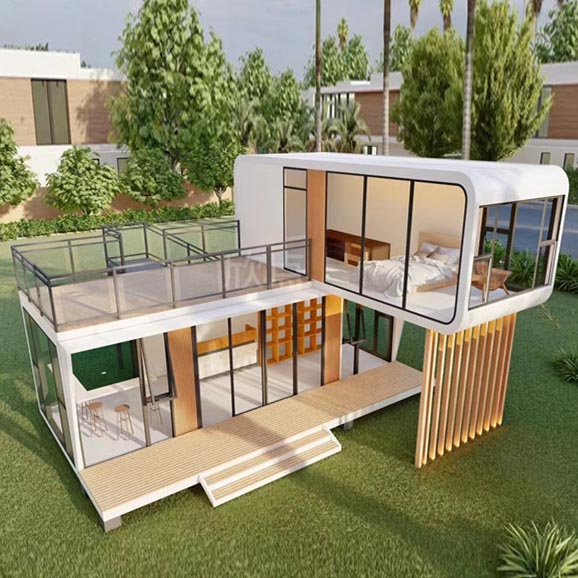What Makes Residential Modular Houses the Future of Modern Living?
In an era defined by rising construction costs, limited urban space, and an increasing demand for sustainable housing, Residential Modular Houses have emerged as a revolutionary solution.
A Residential Modular House is a type of prefabricated building that is constructed off-site in modules, or sections, within a controlled factory environment. These modules are then transported to the construction site, where they are assembled to form a complete house. Unlike mobile homes or temporary housing, modular homes are permanent structures built to the same—or even higher—standards as traditional site-built houses.
The key advantage lies in the efficiency of the process. Traditional construction often faces unpredictable challenges such as weather delays, material wastage, and inconsistent craftsmanship. Modular construction eliminates these problems by using precise, repeatable methods in factory settings. Each component is produced with strict quality control, ensuring superior consistency and durability.
Core Benefits of Residential Modular Houses
-
Speed of Construction: Modular homes can be completed up to 50% faster than conventional homes since construction and site preparation happen simultaneously.
-
Sustainability: Less material waste and optimized energy usage during production make modular housing an eco-friendly choice.
-
Cost Efficiency: Controlled production minimizes labor and resource costs.
-
Quality Assurance: Factory-built modules undergo rigorous inspections and meet standardized codes.
-
Design Flexibility: Modular systems allow for customization in style, size, and layout to match diverse homeowner preferences.
These advantages make modular homes a preferred choice for both developers and private homeowners who seek modern, cost-effective, and sustainable living solutions.
What Are the Key Components and Specifications of a Residential Modular House?
Residential modular houses combine engineering precision with architectural creativity. Each modular unit is an independent structural section designed for strength, comfort, and aesthetic appeal.
Key Components of a Modular Home
-
Steel Frame or Reinforced Structure
Provides exceptional stability and ensures compliance with local building codes. -
Insulated Wall Panels
Typically made from sandwich panels, offering excellent thermal performance and noise reduction. -
Roof System
Designed for long-term weather resistance, featuring waterproof membranes and efficient drainage. -
Flooring System
Can include concrete, wood, or composite materials depending on customer preference and site conditions. -
Interior and Exterior Finishes
Fully customizable — homeowners can select from a range of finishes including tiles, vinyl, or natural wood for interiors and brick, aluminum, or composite panels for exteriors. -
Plumbing and Electrical Systems
Pre-installed within the modules to streamline on-site installation. -
Windows and Doors
Energy-efficient glazing and secure locking systems to improve insulation and safety.
Technical Parameters of Residential Modular Houses
| Parameter | Specification |
|---|---|
| Structure Type | Steel frame / reinforced modular units |
| Wall Material | Sandwich panel, concrete board, or fiber cement |
| Insulation | PU, EPS, or rock wool with R-value 20–40 |
| Roof Type | Flat / gable / custom with waterproof layer |
| Floor Load Capacity | 200–500 kg/m² |
| Lifespan | 50 years or more with proper maintenance |
| Wind Resistance | Up to 250 km/h |
| Seismic Rating | Grade 8 or higher |
| Energy Efficiency | Up to 30% reduction in energy use compared to conventional housing |
| Customization Options | Modular stacking, interior layout, façade finishes |
Advanced Manufacturing Techniques
Each module is produced with Computer-Aided Design (CAD) and Computer Numerical Control (CNC) systems to ensure precise alignment and superior finishing. Quality checks are conducted throughout the process, from welding inspection to thermal testing. The final assembly on-site requires minimal time, usually within days, ensuring faster occupancy.
What Are the Advantages of Living in a Modular Home Compared to a Traditional House?
Residential modular houses are not just an alternative form of housing—they represent a paradigm shift in construction philosophy. The benefits go beyond cost savings and quick delivery; they redefine comfort, safety, and sustainability.
Major Advantages
-
Faster Construction and Delivery
Modular homes are typically completed in half the time required for conventional homes. Since production happens indoors, adverse weather conditions never delay the schedule. -
Superior Energy Efficiency
Thanks to advanced insulation materials and precise construction methods, modular homes achieve exceptional thermal efficiency, reducing long-term utility costs. -
Eco-Friendly Production
Modular construction generates significantly less waste—up to 90% less than traditional building methods. Materials are measured and cut precisely, minimizing leftovers. -
Durability and Safety
Each module is engineered to endure transportation and lifting, making the structure even stronger than many traditional buildings. Their wind and seismic resistance make them ideal for diverse climates. -
Design Freedom
Modern modular houses come in a range of designs—from minimalist single-story layouts to multi-level luxury residences. Homeowners can easily expand their living space by adding more modules. -
Cost Predictability
Since the majority of the construction takes place in a factory, cost overruns due to weather delays or inconsistent labor are virtually eliminated.
Lifestyle and Community Benefits
Residential modular homes also support sustainable community planning. They can be deployed in eco-villages, temporary housing after natural disasters, or as affordable housing units in urban centers. Their adaptability allows for integration with solar panels, rainwater harvesting, and smart home technologies—offering a truly modern lifestyle.
Common FAQs About Residential Modular Houses
Q1: What is the difference between modular homes and traditional site-built houses?
A: Modular homes are built in factories and then assembled on-site, while traditional houses are constructed entirely at the site. Modular homes follow the same building codes as conventional houses, but they benefit from factory-controlled precision, faster delivery, and lower costs.
Q2: What permits are required for a modular home?
A: Modular homes must meet all local zoning and building regulations, just like traditional houses. Manufacturers often assist buyers with the required documentation, and since modular houses comply with national and local building codes, obtaining permits is typically straightforward.
What Is Driving the Global Demand for Residential Modular Houses?
The rise of modular housing is closely linked to global shifts in economics, technology, and sustainability. As cities expand and populations grow, the demand for affordable and eco-conscious housing continues to accelerate.
Market Drivers and Trends
-
Urbanization and Housing Shortages
Rapid urbanization has created an urgent need for housing that can be built quickly and affordably. Modular homes meet this demand without sacrificing quality. -
Sustainability Goals
Governments and developers are increasingly promoting green building initiatives. Modular construction minimizes waste, reduces carbon emissions, and integrates renewable materials, aligning perfectly with sustainability targets. -
Technological Advancements
The use of Building Information Modeling (BIM) and smart production lines allows for better planning, fewer errors, and faster turnaround times. Integration with smart home systems further enhances the appeal of modular homes. -
Affordability and Accessibility
Modular homes lower the cost of ownership by reducing labor, time, and waste. This makes them ideal for first-time homeowners, young families, and retirement housing. -
Global Adaptability
From cold European climates to tropical Asian regions, modular houses can be designed to meet diverse environmental conditions. Customization options allow builders to adapt to local architectural styles and materials.
Future Outlook
The future of housing lies in modularity. With innovations in design, digital manufacturing, and eco-materials, modular homes will continue to challenge traditional construction norms. They offer not just homes, but sustainable living ecosystems that prioritize comfort, efficiency, and environmental responsibility.
At Cymdin, we design and manufacture high-quality Residential Modular Houses tailored to meet the specific needs of homeowners and developers worldwide. Our structures are built to last, combining cutting-edge engineering, modern design, and eco-friendly practices. Each project is guided by a commitment to excellence, safety, and sustainability.
If you’re ready to explore the future of modern living, contact us today to learn more about how Cymdin can help you design a modular home that fits your vision, lifestyle, and budget.





